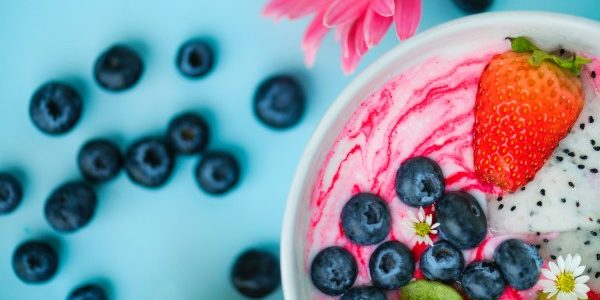Feed for Speed
Swimming is a great way to stay active and healthy, but don’t forget to make sure that your diet compliments your swimming lifestyle! You don’t want exceptional swimming to be compromised by a lack-luster diet. As a swimmer, having proper eating habits is essential to your body’s health and your swimming performance. Here are all of the nutritional essentials you need to know to keep your swimming stamina at its best.
Carbohydrates
Carbohydrates, or carbs, should be a primary focus in every swimmer’s diet. Carbs are essential fuel for your body. Here’s how it works; carbs are stored in your muscles and liver as a substance called glycogen. Your body uses this substance as fuel throughout the day, but especially during a workout or swim. This is because, during a swimming session, the fuel attained through the carbs is used up a lot faster. Therefore, for superior energy, it is important that about half of a serious swimmer’s diet consists of carbs.
For swimmers, it is key to include both simple and complex carbs into your diet. Simple carbs include foods such as fruit, pretzels, and energy drinks. Complex carbs include rice, whole grains, vegetables, potatoes, cereal, and beans.
Proteins
Proteins are another essential food group in a swimmer’s diet. A common misconception is that the more protein you consume, the more muscle you will build. Instead, your body will store excess protein as fat or burn it as fuel. Proteins are needed for rebuilding and repairing muscles. They even help prevent soreness during and after a swim. This is because proteins are composed of amino acids, which drive muscle restoration.
Good examples of nutrition packed proteins include eggs, chicken, fish, and nuts.
Hydration
Water! It is essential to every person on the planet, but especially important for athletes and swimmers. Unlike carbs and protein, your body does not store water. Your body constantly loses water each time you sweat or urinate. Therefore, it is important to consistently re-hydrate in order to replace this lost water. It is important that you are regularly drinking water before you feel thirsty. If you wait until you feel thirsty to drink water, your body is already dehydrated, and your swimming performance will be affected.
Although the typical daily suggested intake of water is at least eight cups, athletes and swimmers should drink more to prevent overheating and fatigue.
Additional Tips
Plan out your carbs! Consume simple carbs (fruit, energy drinks, pretzels) right before, after, and during a swim session. Your body converts simple carbs to energy faster, so they give you an extra boost.
Eat multiple small meals throughout the day instead of a few large meals. Eating multiple smaller portions keeps your body’s energy up without causing you to feel lethargic and sluggish.
Another way to boost performance in the pool is to take vitamins and minerals. Here are some of the most helpful vitamins for swimmers:
- Vitamins B1 and B2: Helps to promote energy, helps positively influence muscle, heart, and nerve functions, helps prevent muscle cramps
- Vitamin C: An antioxidant, and protects you against free radicals
- Iron: Increases bone health and muscle function
Swimming is a fun way to stay active, but it’s important to be conscious of your diet so that your body can stay healthy and happy while you’re enjoying the pool.




